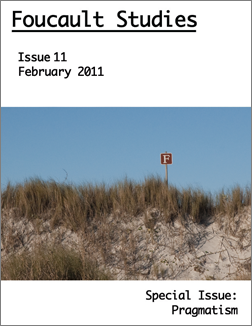“If happiness is not the aim of politics, then what is?”: Rorty versus Foucault
DOI:
https://doi.org/10.22439/fs.v0i11.3209Abstract
In this paper, I present a new account of Richard Rorty’s interpretation of Michel Foucault, which demonstrates that in the course of his career, Rorty presented several diverse (often mutually exclusive) criticisms of Foucault’s political thought. These give different interpretations of what he took to be the flaws of that thought, but also provide different explanations as to the sources of these flaws. I argue that Rorty’s specific criticisms can be divided into two overall groups. Sometimes he saw Foucault’s rejection of bourgeois democracies and bourgeois utopias as a specific case of his general critique regarding the structures of social life as inherently oppressive. At other times he seemed to attribute to Foucault a view that—while not all forms of social life are inherently oppressive—bourgeois democracies certainly are, in a very specific and radical way. In conclusion I show that Rorty’s interpretation of Foucault should be understood in the context of his approach toward the ‘American Cultural Left.’Downloads
Published
2011-02-01
How to Cite
Małecki, W. (2011). “If happiness is not the aim of politics, then what is?”: Rorty versus Foucault. Foucault Studies, (11), 106–125. https://doi.org/10.22439/fs.v0i11.3209
Issue
Section
Special Issue on Foucault and Pragmatism
License
Authors retain copyright to their work, but assign the right of the first publication to Foucault Studies. The work is subject to a CC BY-NC-ND 4.0 license, but despite these restrictions, authors can take for granted that Foucault Studies will permit articles published in Foucault Studies to be translated or reprinted in another format such as a book providing a full reference is made to Foucault Studies as the original place of publication.



